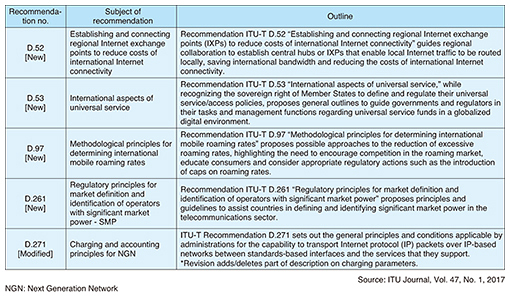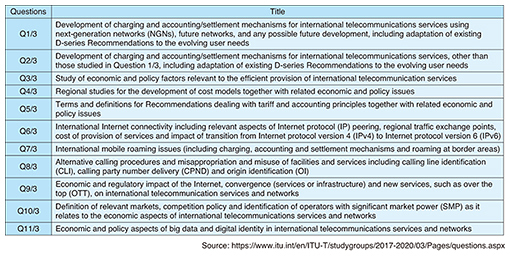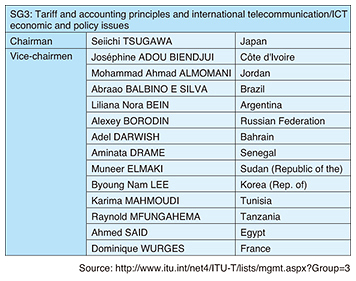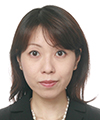 |
|||||||||||
|
|
|||||||||||
|
Global Standardization Activities Vol. 15, No. 7, pp. 45–49, July 2017. https://doi.org/10.53829/ntr201707gls Report on Progress of ITU-T Study Group 3 at the World Telecommunication Standardization Assembly 2016 (WTSA-16)AbstractThe World Telecommunication Standardization Assembly 2016 (WTSA-16) was held in Yasmine Hammamet, Tunisia, from October 25 to November 3, 2016. The following is an outline of discussions on ITU-T (International Telecommunication Union - Telecommunication Standardization Sector) Study Group 3 covered at WTSA-16. Keywords: WTSA, ITU-T, SG3 1. Outline of ITU-T Study Group 3The International Telecommunication Union - Telecommunication Standardization Sector (ITU-T) Study Group 3 (SG3) is a unique study group; it is the only study group in ITU-T dealing with international standardization of non-technical aspects such as tariff settlement and economic policies. Traditionally, SG3’s main role was to establish standards for tariffs for telecommunications, such as coming up with the principles of tariff settlement or making recommendations aimed at reducing international roaming rates. In the past few years, however, more and more proposals have been made to study themes that go beyond the framework of telecommunications, or themes concerning domestic regulations and policies. These proposals have mainly been coming from members from developing countries, and the discussions on such topics have been heated at the meetings. The discussions at the World Telecommunication Standardization Assembly 2016 (WTSA-16) [1], which is the supreme decision-making body of ITU-T, were no exception, and many of the developed countries opposed many of the SG3-related proposals presented by developing countries. The discussions and results are introduced in the following section, along with points to be noted in future SG3 activities. 2. Discussions at WTSA-16 relevant to SG3The discussions relevant to SG3 covered a range of issues from specific technical topics to the SG3 study mandates. They are briefly described here. 2.1 Change of mandateThe term for the domain of study of each SG is a mandate. As mentioned, in the past few years, developing countries have been increasingly vocal in expressing their desire for ITU-T to make recommendations in order to justify domestic regulations or policies. At WTSA-16 also, Russia and the Arab states proposed adding the study of regulatory issues. However, the United States, western European countries, and Japan opposed the addition of this study theme, saying that regulatory issues are solely domestic issues. As a result, the mandate of SG3 was defined as International telecommunication/ICT (information and communication technology) policy and economic issues and tariff and accounting matters (including costing principles and methodologies). The US and western European countries further insisted that study themes be limited to international issues, and the title of SG3 was also agreed to be ITU-T Study Group 3: Tariff and Accounting Principles and International Telecommunication/ICT Economic and Policy Issues, and by adding the word international, it was mandated that SG3 is not to discuss solely domestic issues [2]. 2.2 Approval of five recommendationsFive recommendation proposals (four new and one revision) were submitted to WTSA-16 and were all approved (Table 1). However, the US, Australia, Germany, Canada, and others pointed out that D.52, D.53, and D.261 were domestic issues, and the recommendations were adopted with reservations from the opposing countries [3].
2.3 Compiling the new resolutionsAt WTSA-16, the RCC (Russian regional group) proposed a resolution stating that the ITU-T should get involved in studying all manners of policies for consumer protection in telecommunications/ICT, including fair competition, business models, quality assurance, establishment of reliability, and the assurance of security. The developing countries supported this, but the developed countries, including Japan, opposed it, pointing out the broadness of the scope of consumer protection, and that many of the issues such as quality assurance and security would be redundant with the existing work of ITU-T. As a result, the content was amended to read “to resolve that ITU-T Study Group 3……within their mandates, should carry out studies, including on standards for the protection of consumers and users of telecommunication/ICT services,” and it was newly approved as Studies concerning the protection of users of telecommunication/information and communication technology services (New Resolution 84) [4]. 2.4 International mobile roaming (Resolution 88)Ever since the bill shock issue, which refers to receiving unexpectedly high mobile phone bills, began to surface, SG3 has been considering establishing a recommendation for lowering international mobile roaming rates. However, some members voiced their concern that the existing recommendation was not being fully utilized, and at WTSA-16, the CITEL (American regional group) proposed a new resolution to execute D.98 (Charging in international mobile roaming service). D.98 was approved in 2012; it recommended increased transparency of rates, provision of alternate plans, and appropriate regulatory measures. The new Resolution D.97 on international roaming is listed in Table 1; Resolution 88 encourages each member state to execute D.98, which had been compiled previously. 2.5 Mobile financial service (Resolution 89)There are reportedly 2 billion unbanked people in the world. This means they remain outside of the banking system. Providing access to financial services to these people is referred to as financial inclusion. In ITU-T also, a focus group to discuss digital financial services was established in June 2014, and its target was to expand access to financial services through the use of mobile money. In SG3, some members expressed the desire to take leadership in studying this issue, and work is being done to compile recommendations that encourage countries to introduce competition principles and regulations of fees for service transactions. However, more proposals were put forth from developing countries to include, for example, the issue of granting a license to financial service providers in SG3 recommendations, which is clearly the jurisdiction of financial authorities, and this has become a contentious issue. In WTSA-16, the Arab and African countries proposed a new resolution on “Promoting the use of information and communication technologies to bridge the financial inclusion gap” and resolved to gain the cooperation of telecom and financial authorities. At the same time, it was agreed to avoid redundancy with the work of other standardization bodies and to have the study carried out within the scope of the ITU mandate dealing with telecommunications. The progress in the study on mobile financial services is to be reported at the annual Board meeting and to WTSA in 2020. 2.6 Over the top (OTT) players and servicesThe activities of OTT players who are delivering content such as video and music and providing voice or messaging services have been gaining more prominence recently. Some members of SG3 concerned with the economic impact of these OTT players on network operators proposed making recommendations on the definition of OTT and the principles of regulation, and a rapporteur group was created to discuss specifics. At WTSA-16 also, a new resolution was proposed by the African countries that seeks to resolve the OTT’s impact in an appropriate way. In the meeting, there were severely conflicting opinions between developed countries—primarily the United States—and the African and Arab countries on the scope of service the resolution covers, and the ensuing discussion was difficult. The developed countries of the West wanted to avoid subjecting a wide range of services to the resolution and also wanted to limit its scope to voice service and messaging service operators that use public numbering resources (E.164). The African countries that wanted to include more general OTT services strongly opposed this, and consensus was not reached by the end of the session. Multiple official and unofficial meetings were held, and as a result, while a resolution on OTT services was deferred, as a compromise, additions were made to the mandates of SG2 and SG3 of Resolution 2, adding “Study of the economic and regulatory impact of the Internet” to the mandate of SG3. 3. Future developmentIn addition to the topics above, study questions of each SG in the next study period were approved at WSTA-16. The questions for SG3 are listed in Table 2. The field of study covers a wide range, and as time changes, one can see it is no longer an SG dealing with telecommunications tariffs. However, it should be cautioned that this shift of the agenda has been driven by the developing countries. With SG3 in particular, the profile of attendees has changed dramatically, with over 70% now from developing countries, and a large number of them are from regulatory agencies. Most of the study agendas were proposed by developing countries, which have unique issues such as the lack of competition among private companies. There is also less accumulation of know-how to set regulations. For this reason, rather than solving international issues through standardization, there is an increasing tendency to attempt to resolve their own domestic issues through international agreements.
With this type of agenda proposal, the developed countries expressed the view that these issues have already been resolved through regulatory/policy frameworks or agreements among operators, and that issues unique to developing countries should be dealt with by ITU-D*, not ITU-T. The standard response from participants from developing countries was that the ITU-D cannot make recommendations. Consequently, another issue that emerged at WTSA-16 was determining how ITU should deal with issues that developing countries are trying to resolve through compilation of international recommendations, and how they should form a consensus. In SG3, although their mandate has been limited to international issues through revision of Resolution 2, many of the vice-chairs are from developing countries (Table 3), so this tendency may manifest more strongly. Even broader development of the discussions is envisaged going forward, including the economic aspects of telecommunications and how regulations should be established. Therefore, I think we need to be clearly conscious of what the role of our company and of Japan should be in our endeavors.
References
|
|||||||||||












